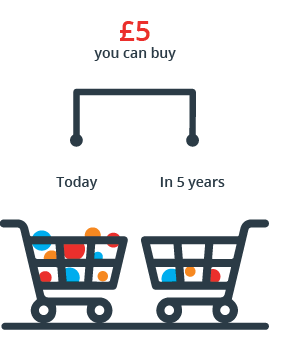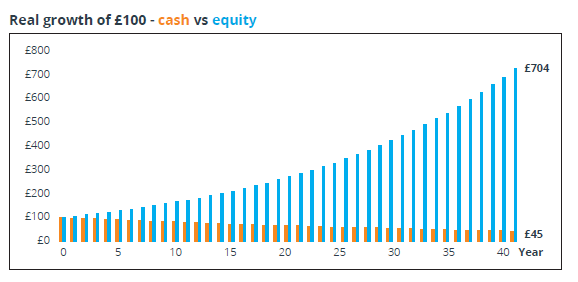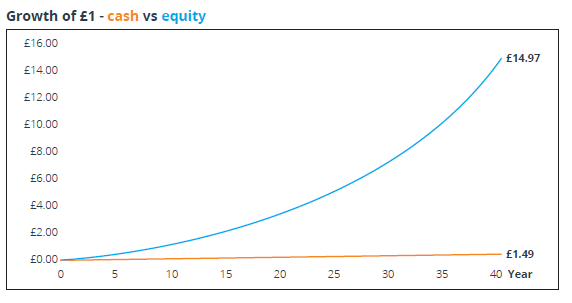How inflation impacts your finances

Getting to grips with the basics
- The impact of high inflation
- What is ‘Bank Rate’?
- Interest rates and inflation
- Purchasing power
- Impact on savings
- Investment potential
- Tax-efficient investments
- PensionsStocks and share ISAs
Following a sustained period of historically low inflation, the recent upsurge in price pressures has vividly highlighted the impact inflation can wreak on people’s finances. A sharp rise in the cost of living effectively takes a large chunk out of the purchasing power of money and thereby erodes the real value of cash savings. It is therefore important to understand the concept of inflation and the impact it has on your wealth. Here, we consider these issues and look at the potential benefits of longer-term investment as a way of protecting your money from the effects of inflation.
Inflation is a term used to describe the increase in the general level of prices for goods and services over time, with the rate of inflation quantifying how quickly prices are rising. There is no single approach to measuring inflation, partly as figures differ depending upon which specific bundle of goods and services are included in the calculations. However, the Office for National Statistics (ONS) publishes a number of consumer price indices each month which provide its latest estimate of inflationary trends. The UK’s official headline measure is the Consumer Prices Index (CPI) 12-month rate which compares prices in the current month with the same period a year earlier.
A good way of understanding how a price index works is to think of an extremely large shopping basket containing a mix of the various goods and services a typical household buys – the price index basically shows changes to the overall cost of that basket over time. For the CPI, prices for around 700 things people regularly buy are recorded each month. These cover a variety of items including a loaf of bread and ready-meals, the cost of a cinema ticket and a pint at the local pub, as well as larger items such as a holiday and a car. To calculate the index, ONS compares the current cost of the basket with what it was a year ago - the change in price level is the annual rate of inflation.
A healthy economy generally requires inflation to be low and stable. While a small amount of inflation is considered helpful, high and unstable rates can cause extreme economic difficulties as it erodes the purchasing power of household finances and makes it difficult for people to plan how much they can spend, save or invest. In the UK, the government has a 2% target for how much prices should go up each year with the Bank of England tasked with keeping the figure around that level. The Bank’s principal tool for maintaining a low and stable inflation rate is to raise or lower interest rates.
Bank Rate is the most important interest rate in the UK and has a significant impact across many aspects of the economy. It is sometimes referred to as the Bank of England Base Rate and is set by the central bank’s nine-member Monetary Policy Committee. The rate directly influences other interest rates, including the lending and savings rates high street banks and building societies offer their customers. The level of the Bank Rate therefore ultimately determines both the cost of mortgages and loans, and how much people can expect to receive on savings held in deposit-based accounts.
Economic theory shows there is an ‘inverse’ relationship between inflation and interest rates: in other words, when interest rates are low inflation tends to rise, and when rates are high inflation tends to fall. This is because high interest rates make it more expensive for people to borrow money and encourages them to save, which means they typically spend less on goods and services, and this results in prices rising more slowly; and vice versa. So if prices are deemed to be increasing too rapidly, the Bank of England will typically raise interest rates in order to try to slow inflation down.
When the rate of inflation is low, its impact can seem relatively modest, but when inflation is high it can drastically erode the purchasing power of money. For example, if the rate of inflation is 1%, then the price of a loaf of bread that cost £1 a year ago would now be £1.01. However, if inflation is running at 10%, the price of the same loaf would rise to £1.10. In other words, households can buy less for the same amount of money or, to put it another way, money has effectively lost value.

Inflation makes things more expensive over time.
Inflation has a similar devaluing effect on deposit-based savings balances. For instance, a saver who held £10,000 in a building society account a year ago earning a rate of 1%, would receive £100 in interest and thereby see their total balance rise to £10,100. However, if inflation was running at 10% then the same £10,000 worth of goods and services that could have been bought a year earlier would now cost £11,000. So, although the saver may feel they have earned £100, when factoring in the effects of inflation, the value of their cash savings has actually declined by £900 in real terms.
While cash savings will always be important, particularly as a source of rainy-day funds, in the current economic climate people holding a large proportion of their assets in cash look set to lose money in real terms. For anyone planning to put money aside for a number of years, it may therefore be worth considering investments as a potential way to protect capital from the effects of inflation. Although past performance is no guarantee of future profits, stock market investments have tended to produce returns that could potentially inflation-proof money over the longer term, providing savers are prepared to take some degree of risk.
As well as potentially offering protection from inflation, some investment products also enjoy significant tax advantages that make them particularly attractive investment propositions. Both pensions and stocks and shares ISAs fall within this category.
Investing via a pension is one of the most tax-efficient methods of saving for the long term as investors receive tax relief at their highest marginal rate of Income Tax on all contributions made subject to annual and lifetime allowances. This means that some of your earnings which would have gone to the government as tax are instead diverted to boost your pension pot. This effectively results in it costing you less to save more in a pension plan.

This graph shows the effect of a 2% inflation rate on £100 over a 40-year period with cash assumed to earn no interest – maybe kept under your mattress! A growth rate of 7% per annum is assumed for equities but is for illustrative purposes only and not an indication of future performance. After 40 years, the initial £100 can only buy goods that would be worth just under £45 at today’s prices, compared to an equity investment which would have the purchasing power of £704.

Obviously, very few of us would keep cash under the mattress, but even with cash deposits earning 1% a year, £1 would only be worth £1.49 after 40 years if held in cash, or over 10 times that amount if invested in equities, assuming a growth rate of 7% p.a.
Call our financial specialists for a FREE initial consultation on 0808 159 6740
Tees are here to help
We have many independent financial advisers who are based in:
Cambridgeshire: Cambridge
Essex: Brentwood, Chelmsford, and Saffron Walden
Hertfordshire: Bishop's Stortford and Royston
But we can help you wherever you are in England and Wales.
This material is intended to be for information purposes only and is not intended as an offer or solicitation for the purchase or sale of any financial instrument. It is not intended to provide and should not be relied on for accounting, legal or tax advice, or investment recommendations. Past performance is not a reliable indicator of future returns and all investments involve risks. Some information quoted was obtained from external sources we consider to be reliable.
Tees is a trading name of Tees Financial Limited which is authorised and regulated by the Financial Conduct Authority. Registered number 211314. Tees Financial Limited is registered in England and Wales. Registered number 4342506.
Chat to the Author, James Appleby
Managing Director at Tees Wealth, Bishop's Stortford office
Meet James


